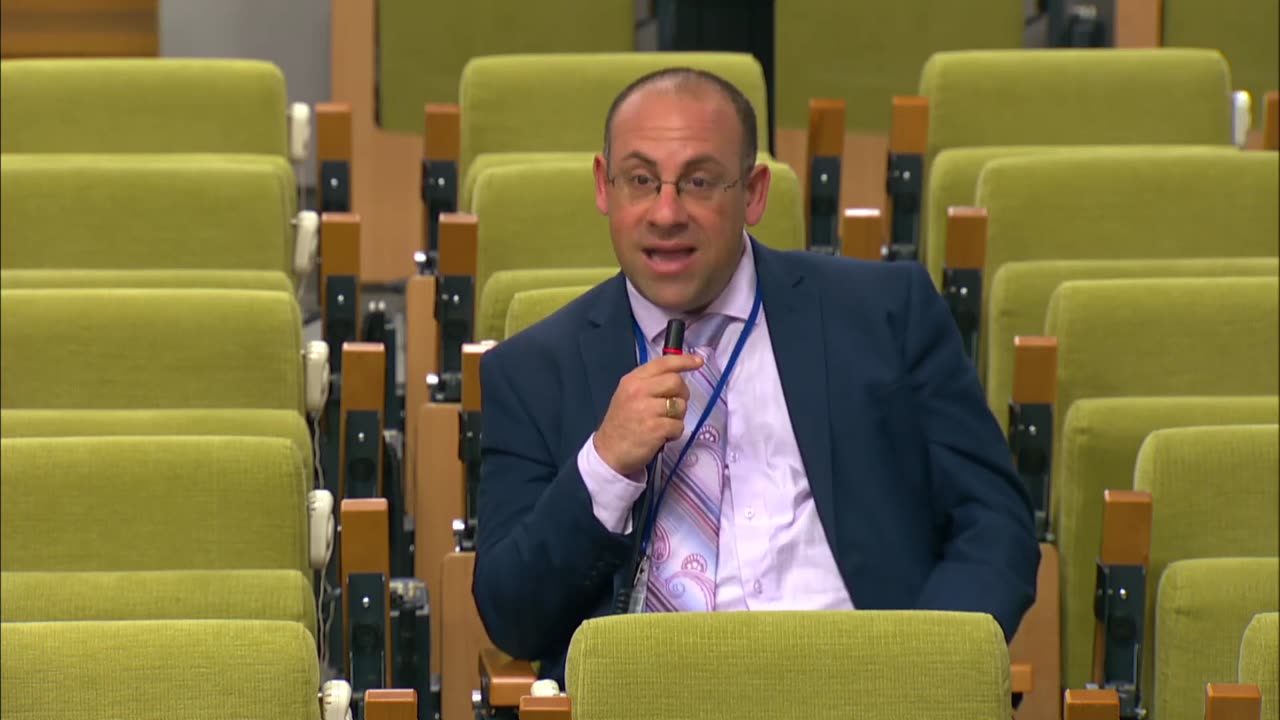Premium Only Content

Human rights in Palestinian occupied territories: UN Special Rapporteur's Briefing
Being a Jew is not a race of human, but a religion!
Why did the Jews take over the term "antisemite", when there are many semites? Israel does not represent them all! See definition.
ANTI
Opposed to, or against a particular thing or person:
We've received a lot of anti letters about that newspaper article.
Just because I won't join you, it doesn't mean that I'm anti you.
SEMITE,
Name given in the 19th century to a member of any people who speak one of the Semitic languages, a family of languages spoken primarily in parts of western Asia and Africa. The term therefore came to include Arabs, Akkadians, Canaanites, Hebrews, some Ethiopians (including the Amhara and the Tigrayans), and Aramaean tribes. Although Mesopotamia, the western coast of the Mediterranean, the Arabian Peninsula, and the Horn of Africa have all been proposed as possible sites for the prehistoric origins of Semitic-speaking populations, there remains no archaeological or scientific evidence of a common Semitic people. Because Semitic-speaking peoples do not share any traits aside from language, use of the term “Semite” to refer to the broad range of Semitic-speaking peoples has fallen out of favour. For this reason, some critics even encourage the removal of the hyphen in the term anti-Semitism to help dispel any pseudoscientific notions of a "Semitic race." They advocate instead for the use of antisemitism to describe the hostility toward or discrimination against Jews as a religious or racial group.
In fact, by 2500 BCE Semitic-speaking peoples had already become widely dispersed throughout western Asia. In Phoenicia they became seafarers. In Mesopotamia they blended with the civilization of Sumer. The Hebrews settled with other Semitic-speaking peoples in Palestine. (Britannica)
Press conference by Francesca Albanese, Special Rapporteur on the situation of human rights in the Palestinian territories occupied since 1967.
The Chair of the Independent International Commission of Inquiry on the Occupied Palestinian Territory, including East Jerusalem, and in Israel, Navi Pillay, said that there are “clear indications that international crimes have been committed” in the current conflict.
Briefing journalists in New York today (25 Oct), Pillay added, “So accordingly in line with our mandate, we began collecting evidence of war crimes committed by Hamas and other Palestinian armed groups and by Israeli security forces, and we issued a call for submissions later last week.”
Pillay also said, “I assure you that we intend to continue pursuing the fulfilment of our mandate, including in relation to making recommendations, in particular on accountability measures, with a view to avoiding and ending impunity and ensuring legal accountability, including individual criminal and command responsibility.”
The Commission's Chair noted, “International law has clear obligations on every state whether they exercising self defense, or hostile warfare to protect civilians, and I fear that this is not happening. Civilians are being targeted and civilian objects, structures are being damaged, irreparably, so it's a huge concern and we are going to be looking into this, expanding on this.”
Another member of the Commission, Chris Sidoti, noted that the law of armed conflict applies in this case.
Sidoti added, “That does mean that the State of Israel has the obligation to defend its citizens. But it means that it must be done in accordance with international law, and the principles of necessity, reasonableness, proportionality, discrimination, precaution and so forth. And it's those principles and the observance of those principles that becomes the critical question. And that's the question that we are going to have to examine in the investigation that, as our chair has indicated, we've already announced.”
The expert concluded, “Is it possible to conduct the kind of military operation that Israel is conducting in Gaza and still comply with international law? That is a live question, we don't have conclusions, we need to investigate. But that is really the fundamental question that confronts the international system at the moment. Israel has an obligation to defend its citizens, no doubt about that. But is it possible to do that in the way in which it is being done and still comply with international law? That's the question.”
-
 2:53
2:53
No wonder Aliens just drive by
4 months agoHuge Event! Remotely Detonated Pagers Wound Thousands of People, Hospitals Overwhelmed In Lebanon
1192 -
 LIVE
LIVE
Glenn Greenwald
2 hours agoSection 702 Warrantless Surveillance Ruled Unconstitutional: Press Freedom Advocate Seth Stern Explains; The Rise of Unions & the Impact of Trump's Populism with Author Eric Blanc | SYSTEM UPDATE #395
4,182 watching -
 52:47
52:47
Kimberly Guilfoyle
4 hours agoDismantling DEI Once and For All, Live with Tyler O’Neil & Eric Deters | Ep.190
48.6K11 -
 1:34:59
1:34:59
Redacted News
4 hours agoBREAKING! TRUMP SIGNS ORDER TO RELEASE JFK FILES, CIA IS FURIOUS | REDACTED NEWS
158K259 -
 1:36:09
1:36:09
Benny Johnson
4 hours ago🚨WATCH: President Trump Declassifies JFK, RFK, MLK Files LIVE Right Now in Oval Office, History Now
117K207 -
 LIVE
LIVE
Common Threads
2 hours agoLIVE DEBATE: Will Democrats Roll Over or Fight Back?
112 watching -
 LIVE
LIVE
LFA TV
8 hours agoDonald Trump Sets Israel Up for Failure | TRUMPET DAILY 1.23.25 7pm
469 watching -
 LIVE
LIVE
Sarah Westall
1 hour agoPsychological Warfare, Modern Weapons of War, Panama Canal, Special Ops & more w/ Michael Yon
867 watching -

Chrissy Clark
1 hour agoTrump Responds To Woke Bishop, Cardi B’s TikTok FAIL, & MORE I Underreported Stories
8.69K -
 LIVE
LIVE
theDaily302
11 hours agoThe Daily 302 - Colonel Roxane Towner Watkins
126 watching